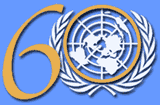
Sergio Vieira de Mello - UN Photo
A partir de 2010, la Fondation Sergio Vieira de Mello prévoit d’honorer la mémoire et la contribution de M. Sergio Vieira de Mello en lançant un Prix annuel, en son nom, qui sera décerné aux individus, institutions ou communautés en reconnaissance d’actions exceptionnelles entreprises dans le but de réconcilier de façon pacifique les peuples et les parties en conflit. Dès 2010, les lauréat(s) seront annoncé(s) lors de la Journée mondiale de l'aide humanitaire.
Questions – réponses
Q. Qui a institué la Journée mondiale de l'aide humanitaire?
R. L’Assemblée générale a décidé en décembre 2008 de commémorer chaque année la Journée mondiale de l'aide humanitairele 19 août pour « contribuer à sensibiliser le public aux activités humanitaires dans le monde et à l’importance de la coopération internationale dans ce domaine et de rendre hommage à tout le personnel humanitaire, au personnel des Nations Unies et au personnel associé qui s’emploient à promouvoir la cause humanitaire, ainsi qu’à celles et ceux qui ont perdu la vie dans l’exercice de leurs fonctions. »
Q. Le 19 août est également la date à laquelle, en 2003, a eu lieu l’attentat à la bombe contre l’Hôtel Canal à Bagdad et qui a entrainé la mort de 22 personnes parmi lesquelles le RSSG, M. Sergio Vieira de Mello. S’agit-il donc de commémorer cet événement?
R. L’Assemblée générale a estimé que le choix de cette date était approprié. Cette première année sera dédiée principalement à la mémoire de tous ceux et celles qui ont perdu leur vie alors qu’ils étaient engagés dans une opération humanitaire à une époque où ce travail devient de plus en plus dangereux. Le but de cette journée est également de mettre en avant les besoins et défis humanitaires actuels, et en particulier les bénéficiaires au nom desquels nous faisons ce travail.
Q. La Journée mondiale de l'aide humanitaire est-elle dédiée aux travailleurs humanitaires ou bien à la cause humanitaire?
R. Aux deux. Les membres exécutifs du Comité Permanent Inter-Institutions ont déterminé trois thèmes pour les commémorations de la Journée mondiale de l'aide humanitaire de 2009 :
*honorer ceux et celles des humanitaires qui ont perdu leur vie dans l’exercice de leurs fonctions;
*exprimer la reconnaissance pour le travail que les humanitaires accomplissent à travers le monde;
*attirer l’attention sur les besoins humanitaires à travers le monde. D’autres thèmes spécifiques seront retenus pour les commémorations ultérieures.
Q. A quel public cette campagne est-elle destinée?
R. Comme le stipule l’Assemblée générale, cette campagne a pour cible le public en général, aussi bien dans les pays qui reçoivent une assistance humanitaire que dans les pays donateurs.
Q. Combien d’argent [destiné à l’assistance humanitaire] les Nations Unies dépensent pour cette campagne ?
R. Rien. L’Assemblée générale a donné pour instruction que la Journée mondiale de l'aide humanitaire soit commémorée « dans le cadre des ressources existantes » ce qui signifie qu’aucun membre du personnel ou activités supplémentaires n’a été budgétisé pour cette campagne.
Q. Pourquoi la Journée mondiale de l'aide humanitaire ne dispose pas d’un logo?
R. Les membres exécutifs du Comité Permanent Inter-Institutions ont demandé à OCHA de coordonner les activités des membres de la communauté humanitaire pour cette commémoration et de faire connaître la journée inaugurale à travers le réseau du Secrétariat de l’ONU, y compris le Département de l’Information et le Centre d'actualités; les réseaux de distribution des institutions des Nations Unies et le réseau des ONGs. Il convient cependant de noter que la Journée mondiale de l'aide humanitaire n’est pas exclusive à l’ONU ou à une quelconque institution ou organisation.
Q. Que peuvent faire les autres institutions ainsi que le public en général pour soutenir la Journée mondiale de l'aide humanitaire ?
R. S’assurer que les collègues et membres du public soient au courant de la Journée, grâce notamment à la distribution de la brochure sur la Journée mondiale de l'aide humanitaire ainsi que le spot d’une minute; en utilisant les messages clés prévus à cet effet pour que les personnalités politiques et représentants officiels en parlent lors de rencontre avec les médias; en disséminant ces informations aussi largement que possible à travers les réseaux formels et informels; en faisant pression sur les principaux médias nationaux et internationaux pour qu’ils diffusent le spot d’information incluant la déclaration du Secrétaire Général; en encourageant les travailleurs humanitaires, quand cela est possible, à parler de leur travail aux médias; en organisant des évènements publics présentant l’action humanitaire.
Fonte,http://www.un.org/fr/events/humanitarianday/2009/qna.shtml, consultado a 11 de Setembro de 2009







